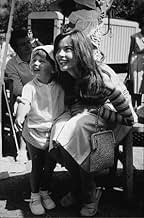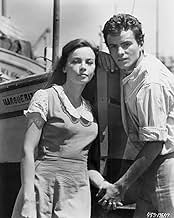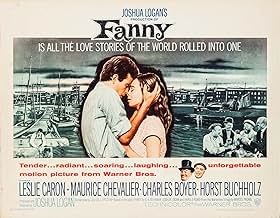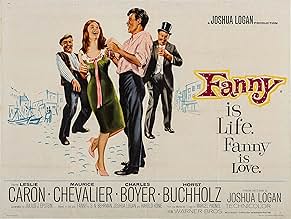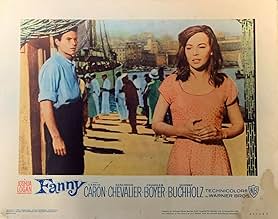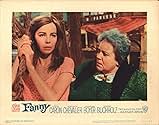AVALIAÇÃO DA IMDb
6,8/10
2,8 mil
SUA AVALIAÇÃO
Adicionar um enredo no seu idiomaYoung Marius dreams of leaving his dull provincial life and seeing the world. When the beautiful Fanny declares her adoration for him, Marius must choose between an adventurous life at sea a... Ler tudoYoung Marius dreams of leaving his dull provincial life and seeing the world. When the beautiful Fanny declares her adoration for him, Marius must choose between an adventurous life at sea and the grandest adventure of all: love.Young Marius dreams of leaving his dull provincial life and seeing the world. When the beautiful Fanny declares her adoration for him, Marius must choose between an adventurous life at sea and the grandest adventure of all: love.
- Indicado a 5 Oscars
- 1 vitória e 16 indicações no total
Salvatore Baccaloni
- Escartifigue (Ferryboat Captain)
- (as Baccaloni)
Raymond Bussières
- The Admiral
- (as Raymond Bussieres)
Joël Flateau
- Cesario (Fanny's Son)
- (as Joel Flateau)
Alan Colegrave
- Dead Licker
- (não creditado)
Dominique Davray
- Woman #1 at Fish Market
- (não creditado)
Germaine Delbat
- Louis Panisse's Wife
- (não creditado)
Enredo
Você sabia?
- CuriosidadesJoshua Logan was anxious to replicate the success of Gigi (1958) and according to Leslie Halliwell insisted on a publicity campaign for "Joshua Logan's 'Fanny' ", until the double meaning was explained to him.
- Erros de gravaçãoIn the opening scene at the bar, Marius is seen grabbing a green bottle of wine for his customer from the bar, but when he arrives at the outdoor table to pour the glass, the bottle is now clear.
- ConexõesFeatured in The 75th Annual Academy Awards (2003)
Avaliação em destaque
I won't play the "movie purist" card and pretend that it's not possible to remake Marcel Pagnol's "Marseilles" trilogy, it IS possible. But it's not possible to replace an actor like Raimu, he wasn't just César the gruff and wise barkeeper on Marseilles' waterfront, he was the soul of Marseilles' trilogy, he was the voice, the spirit
and the star. So, it's as hard imagining the trilogy without him than "Casablanca" without Bogart. Yet Raimu died before the final opus "César" was made into a play, and Pagnol's three-part story had such an immediate international resonance that it was begging for remakes and adaptations
and that it inspired a successful Broadway musical is a credit to the universality of the story. So the show had to go on.
But no one can replace Raimu, and in fact, even the other players, Orane Demazis who played the fragile but progressively confident Fanny, Fernand Charpin who played the brave bourgeois Panisse, not to mention Pierre Fresnay as the bitter and tormented Marius were all hard to replace, so one must make the distinction between remaking and retelling. This is what Joshua Logan's "Fanny" does, it reprises the Broadway musical but adapts it into the movie format, compacting the three original movies into one of two hours and ten minutes. The film is colored and colorful, magnificently rendering the sunny soul of Marseilles, and the blueness look even more attractive and hypnotic for Marius whose childhood dream is to escape from the banality of life. He's the freest character of the trilogy, but not the wisest.
Wisdom belongs to César, the barkeeper, and the film tactfully starts with a replay of the famous scene where he shows his son Marius that it takes one third of four different ingredients to make some cocktail. There can't be four thirds, Marius says. It depends on the size of the thirds, retorts César. This scene demonstrates the power of this character, even when he speaks nonsense, he's actually right because he always makes his point. He's the touchstone of a saga of French intonations but that deals with universal life themes such as duty, gender roles and social customs, making almost a hero out of an old man marrying a young woman because he's saving her from disgrace and gives a poor out-of-wedlock child a name. Marseilles' trilogy belongs to the past but that doesn't prevent from rooting for Marius' dreams, Fanny's unfaithful thoughts and Panisse's financial arguments when he woos Fanny, César is actually the most transparent of all, no wonder he's the pillar of the story.
Now, it all comes down to one question: does Joshua Logan's "Fanny" do justice to the original trilogy? It is a matter of opinion and depends on the way you look at the original trilogy. If it's a verbal masterpiece with great insightful quotes about life and death, such as "honor being like a match, you only use it once" or "an empty chair can be sadder than a grave" then yes, "Fanny" of 1961 is a great tribute to Pagnol's eloquence and capability to translate with the right words the emotional complexities of human psyche. Now, if you forever associate the film to the spectacular performance of Raimu, these intimate moments caught in black-and-white, with a few tear-pulling revelations, volcanic tirades and histrionic confrontations, you might find in "Fanny" a pale imitation. But for the film's defense, I don't think anyone ever tried to imitate an actor, one of the film's masterstrokes was to cast French actors, it's twice an excellent idea, they're all aware of the trilogy's reputation and their accent give the film's French touch.
Charles Boyer was believable as a man who'd embody César's psychological traits without being Raimu's César, Leslie Caron added her own dimension of tragic melancholy and even Maurice Chevalier was surprisingly poignant as the unsung hero Panisse. I could even have seen him nominated instead of Boyer. Horst Bucholz was good as Marius, with a sort of Montgomery Clift's fire burning in his dark eyes, and like a good cocktail, Joshua Logan doesn't take the initial trilogy for granted, he changed the balance and gave Fanny and Panisse get the most important roles, maybe only Raimu could have made a passive observer like César such a driving force. But "Fanny" is structured in such a way that the actions sometimes count more than the little introspective moments, even though they spiced up the original trilogy.
So maybe that's the one flaw I'd concede to "Fanny", it puts a lot of good things together but it lacks that little zest that made the first trilogy such a tasty cocktail. And while it provides some powerful emotional moments, the conclusion is treated in a rather rushed away, with a ten-year old boy and a new house in the countryside. I don't know what inspired these artistic licenses, but it sadly took away the film from the atmosphere and the spirit it had set up, there's a sort of change in the air that feels awkward and make hardly believable that so many secrets, revelations, pains and troubles would be relieved in one day, ten minutes in cinematic language, and while I was critical of Césariot's character in the original film, the child doesn't exactly exude realistic vibes and his immediate complicity with Marius was sadly corny.
"Fanny" doesn't shine right away but there are like two hours of the film that work and despite a clumsy beginning and awkward ending, it doesn't ruin the enjoyment for all that, I'd still recommend watching the original first. In fact, I'd recommend the original, period.
But no one can replace Raimu, and in fact, even the other players, Orane Demazis who played the fragile but progressively confident Fanny, Fernand Charpin who played the brave bourgeois Panisse, not to mention Pierre Fresnay as the bitter and tormented Marius were all hard to replace, so one must make the distinction between remaking and retelling. This is what Joshua Logan's "Fanny" does, it reprises the Broadway musical but adapts it into the movie format, compacting the three original movies into one of two hours and ten minutes. The film is colored and colorful, magnificently rendering the sunny soul of Marseilles, and the blueness look even more attractive and hypnotic for Marius whose childhood dream is to escape from the banality of life. He's the freest character of the trilogy, but not the wisest.
Wisdom belongs to César, the barkeeper, and the film tactfully starts with a replay of the famous scene where he shows his son Marius that it takes one third of four different ingredients to make some cocktail. There can't be four thirds, Marius says. It depends on the size of the thirds, retorts César. This scene demonstrates the power of this character, even when he speaks nonsense, he's actually right because he always makes his point. He's the touchstone of a saga of French intonations but that deals with universal life themes such as duty, gender roles and social customs, making almost a hero out of an old man marrying a young woman because he's saving her from disgrace and gives a poor out-of-wedlock child a name. Marseilles' trilogy belongs to the past but that doesn't prevent from rooting for Marius' dreams, Fanny's unfaithful thoughts and Panisse's financial arguments when he woos Fanny, César is actually the most transparent of all, no wonder he's the pillar of the story.
Now, it all comes down to one question: does Joshua Logan's "Fanny" do justice to the original trilogy? It is a matter of opinion and depends on the way you look at the original trilogy. If it's a verbal masterpiece with great insightful quotes about life and death, such as "honor being like a match, you only use it once" or "an empty chair can be sadder than a grave" then yes, "Fanny" of 1961 is a great tribute to Pagnol's eloquence and capability to translate with the right words the emotional complexities of human psyche. Now, if you forever associate the film to the spectacular performance of Raimu, these intimate moments caught in black-and-white, with a few tear-pulling revelations, volcanic tirades and histrionic confrontations, you might find in "Fanny" a pale imitation. But for the film's defense, I don't think anyone ever tried to imitate an actor, one of the film's masterstrokes was to cast French actors, it's twice an excellent idea, they're all aware of the trilogy's reputation and their accent give the film's French touch.
Charles Boyer was believable as a man who'd embody César's psychological traits without being Raimu's César, Leslie Caron added her own dimension of tragic melancholy and even Maurice Chevalier was surprisingly poignant as the unsung hero Panisse. I could even have seen him nominated instead of Boyer. Horst Bucholz was good as Marius, with a sort of Montgomery Clift's fire burning in his dark eyes, and like a good cocktail, Joshua Logan doesn't take the initial trilogy for granted, he changed the balance and gave Fanny and Panisse get the most important roles, maybe only Raimu could have made a passive observer like César such a driving force. But "Fanny" is structured in such a way that the actions sometimes count more than the little introspective moments, even though they spiced up the original trilogy.
So maybe that's the one flaw I'd concede to "Fanny", it puts a lot of good things together but it lacks that little zest that made the first trilogy such a tasty cocktail. And while it provides some powerful emotional moments, the conclusion is treated in a rather rushed away, with a ten-year old boy and a new house in the countryside. I don't know what inspired these artistic licenses, but it sadly took away the film from the atmosphere and the spirit it had set up, there's a sort of change in the air that feels awkward and make hardly believable that so many secrets, revelations, pains and troubles would be relieved in one day, ten minutes in cinematic language, and while I was critical of Césariot's character in the original film, the child doesn't exactly exude realistic vibes and his immediate complicity with Marius was sadly corny.
"Fanny" doesn't shine right away but there are like two hours of the film that work and despite a clumsy beginning and awkward ending, it doesn't ruin the enjoyment for all that, I'd still recommend watching the original first. In fact, I'd recommend the original, period.
- ElMaruecan82
- 28 de ago. de 2017
- Link permanente
Principais escolhas
Faça login para avaliar e ver a lista de recomendações personalizadas
- How long is Fanny?Fornecido pela Alexa
Detalhes
Bilheteria
- Faturamento bruto nos EUA e Canadá
- US$ 9.996.178
- Tempo de duração2 horas 14 minutos
- Proporção
- 1.85 : 1
Contribua para esta página
Sugerir uma alteração ou adicionar conteúdo ausente




